高中英语语法系列――形容词和副词
高中英语语法—形容词、副词

例题
1) Tony is going camping with ___ boys. A. little two other B. two little other C. two other little D. little other two
答案点拨:C 由"限定词--数词--描绘词--(大小,长短,形状,新 旧,颜色) --性质--名词"的公式可知数词,描绘词,性质依次顺序 只有C符合答案。
2、+ed
excite—excited worry—worried surprise—surprised close—closed interest—interested frighten—frightened
3、+ing
interest—interesting excite—exciting surprise—surprising follow—following
4、+y 所有表示天气状况的的形容词
sun—sunny snow—snowy wind—windy rain-rainy cloud—cloudy health—healthy
5、+ en
wool-woolen wood--wooden
6、+ern (东西南北)
east--eastern south-southern west--western north--northern
多个形容词做定语时的排列顺序:
在不确定的时候,可参照如下口诀: 美小圆旧黄,法国木书房 注释:美——描述性质;小——大小、长短、 高矮胖瘦 旧——新旧、年龄 圆——形状;黄——颜色;法国——产地、 国籍;木——材料;书房——用途 a new red silk cap一顶红色新丝帽 a short young Japanese businessman
【高中英语语法】形容词副词

句型 4 as much/many…as…(如……那样 多的) I haven't got as much money as you asked. (我没有凑到你所要求的那么多的钱。) She has invited as many guests as the dining hall can hold. (她按餐厅容量邀请了客人。)
二、比较用法
(1)原级比较
句型 1. as + adj.+as……(如……那样……) 例:He is as tall as I (am tall). 例:This is as good as that(is good).
解说 本句式是表达肯定的原级比较,也叫作 同等比较,并可改用下列方式表达。 He is as tall as I (am tall). He and I are of the same height. This is as good as that(is good). (quality)
II.前位修饰法与后位修饰法 定义 把修饰用的形容词置于其所修饰的名词之前, 称为前位修饰法(Premodification),反之若把 修饰用的形容词置于其所修饰的名词之后称为后 位修饰法(Post-modification) 一个年轻的漂亮女人 A beautiful young lady A lady both beautiful and young
不过这些限定词若是遇到“all,both,many, such,double,what”等时须移在其后(其 中有的是固定的句式)。 例:We must solve all these problems. (我们必须解决所有这些问题)。 例:Both my parents are away sightseeing in Europe now. (现在我的父母亲都到欧洲去观光旅行不在 家。)
高中英语语法-形容词和副词

quick、fast与soon: quick往往指反应速度快, fast往往指运动速度快, soon则表示时间上很快即将发生: After a quick breakfast, he hurried to school. A train is much faster than a bus. His father will be back to China very soon.
Tony is going camping with ______ boys. A. little two other B. two little other C. two other little D. little other two
答案:C. 由\“限定词--数词--描绘
One day they crossed the ____bridge behind the palace. A. old Chinese stone B. Chinese old stone C. old stone Chinese D. Chinese stone old 答案A. 年龄+国家+材料。
(3) tall与high: Tall 指身高的高度,用于人和动物, 反义词为 short He is very short/tall. High 指物体的高度,另可形容价格,质量等, 反义词为low The kite is flying very high. Tall和high都可用来指tree, building, tower等, 但mountain只能用high形容。
1.Chinese, glass, a, beautiful, table a beautiful Chinese glass table 2.wonderful, my, garden, new, large my wonderful large new garden 3. a, round, table, small a small round table 4. a, old, dirty, brown shirt a dirty old brown shirt
高中英语语法系统讲解之四形容词和副词
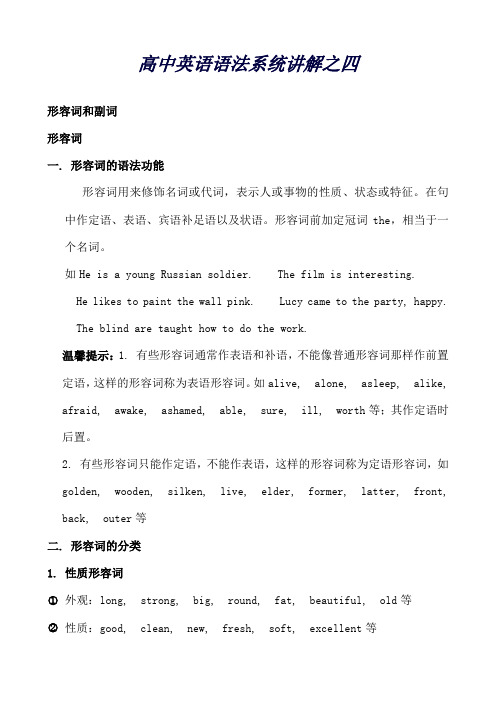
高中英语语法系统讲解之四形容词和副词形容词一. 形容词的语法功能形容词用来修饰名词或代词,表示人或事物的性质、状态或特征。
在句中作定语、表语、宾语补足语以及状语。
形容词前加定冠词the,相当于一个名词。
如He is a young Russian soldier. The film is interesting.He likes to paint the wall pink. Lucy came to the party, happy. The blind are taught how to do the work.温馨提示:1. 有些形容词通常作表语和补语,不能像普通形容词那样作前置定语,这样的形容词称为表语形容词。
如alive, alone, asleep, alike, afraid, awake, ashamed, able, sure, ill, worth等;其作定语时后置。
2. 有些形容词只能作定语,不能作表语,这样的形容词称为定语形容词,如golden, wooden, silken, live, elder, former, latter, front, back, outer等二. 形容词的分类1. 性质形容词○1外观:long, strong, big, round, fat, beautiful, old等○2性质:good, clean, new, fresh, soft, excellent等○3颜色:red, black, green, blue, white, brown等○4情绪:happy, sad, sorry, nervous, anxious等○5性格:kind, cruel, honest, foolish, lazy, rude等○6状况:careful, blind, deaf, cheap, hungry等○7评论:great, true, necessary, difficult, wrong等2. 关系形容词○1地域:Chinese, American, Asian, Pacific等○2质料:wooden, golden, plastic, metallic等○3科技:electric, chemical, atomic, medical等○4意识:communist, social, political, religious等○5行业:industrial, agricultural, economic, military等三. 形容词在句中的位置1.单个形容词作定语时,一般放在被修饰的名词之前;两个或两个以上的形容词修饰一个名词时,同种类形容词的排列顺序一般应考虑以下两种情况:○1和被修饰的名词关系比较密切的形容词位置更靠近名词。
高中英语语法复习之形容词副词

高考英语语法复习之形容词、副词专项一、形容词、副词的作用与位置形容词是用来修饰名词的,常被放在名词前作定语,或放在系动词后面作表语。
而副词则用来修饰形容词、动词,其他副词或者句子,一般位于形容词之前,动词之后或句子之首。
以下属几种特殊情况,须牢记;(1)形容词短语作定语,定语后置。
a language difficult to master, a leaning tower about 180 feet high(2)表语形容词(afraid、alike、alone、asleep、awake、alive等)作定语,定语后置。
如a man alive。
有些表身体健康状况的形容词如well、faint、ill只作表语。
sick既可作表语又可作定语,ill如作定语意为“bad”。
(3)用作定语,修饰由不定代词one、no、any、some和every构成的复合词如anything、something等时,通常后置。
如:I have something important to tell you.(4)else常用作疑问代词和不定代词的后置定语。
(5)enough、nearby修饰名词前置或后置,程度副词一般位于形容词、副词前面,enough 修饰形容词、副词时,必须后置。
(6)几个副词并列作状语时,其顺序较灵活,但一般是:方式→地点→时间。
如:We had a good time together outdoors last Sunday.(7)频度副词如often、always、usually等在be动词后,行为动词前。
(8)几个并列的形容词作定语,其语序通常为:限定语(The、A)+ 描绘性形容词+ size(大小)+ shape(形状)+age(年龄、时间)+ color(颜色)+ origin(国籍、来源)+ material(材料)+ purpose(目的)+ 名词。
可记为:“县官行令宴国才。
高中英语语法之形容词和副词
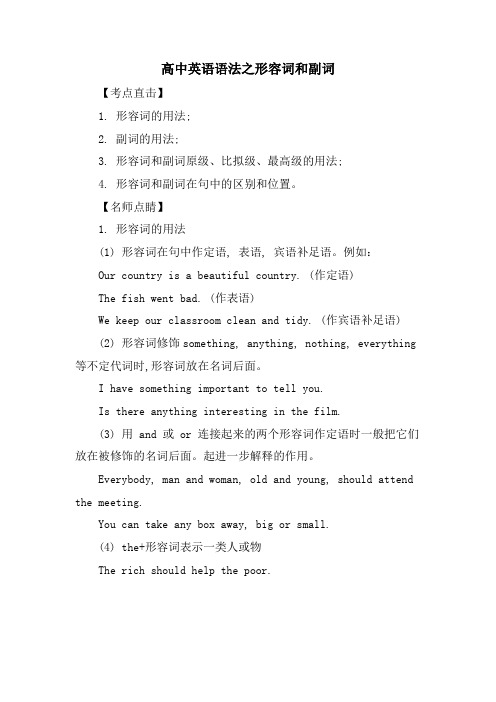
高中英语语法之形容词和副词
【考点直击】
1. 形容词的用法;
2. 副词的用法;
3. 形容词和副词原级、比拟级、最高级的用法;
4. 形容词和副词在句中的区别和位置。
【名师点睛】
1. 形容词的用法
(1) 形容词在句中作定语, 表语, 宾语补足语。
例如:
Our country is a beautiful country. (作定语)
The fish went bad. (作表语)
We keep our classroom clean and tidy. (作宾语补足语)
(2) 形容词修饰something, anything, nothing, everything 等不定代词时,形容词放在名词后面。
I have something important to tell you.
Is there anything interesting in the film.
(3) 用 and 或 or 连接起来的两个形容词作定语时一般把它们放在被修饰的名词后面。
起进一步解释的作用。
Everybody, man and woman, old and young, should attend the meeting.
You can take any box away, big or small.
(4) the+形容词表示一类人或物
The rich should help the poor.。
高三英语语法总复习——形容词和副词
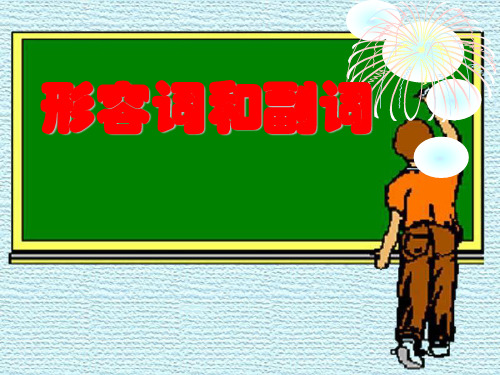
2)有些以-ly 结尾既为形容词,也为副词。 daily,weekly,monthly,yearly,early The Times is a daily paper. It is published daily.
1.There are some (dead )leaves on the ground. 地上有些枯叶。
2.The terrorist's attack caused more than three hundred (death).
恐怖分子的袭击造成了3百人的伤亡。
3.The roar of the explosion was followed by a (deathly) silence.
interesting because of its association with persons or events in history: 具有历史意义的首次太空旅行。而且也 用于形容那些因与历史事件或人物有联系而有名或有趣的事物:
a historic house. Historicalrefers to whatever
3. worthwhile 可作表语和定语 It is worthwhile to do或 It is worthwhile doing
dead --- deadly --- deathly
dead adj.死的, 无感觉的, 呆板的, 不流动的, (语言、习惯)废 弃了的, 熄灭的 n.死者 adv.完全地, 绝对的, 突然的 death n.死, 死亡, 致死的原因, 毁灭, 屠杀 deadly adj.致命的, 势不两立的, 死一般的, 极度的, 必定的 deathly adj.死一般的 adv.象死一样地
高中英语语法专题第六章 形容词和副词

第六章形容词和副词英语中的形容词和副词有三个比较等级:原级、比较级和最高级。
形容词/副词比较级的用法是中学英语的重要语法项目之一,也是历年高考考查的要点之一。
一、形容词/副词的比较级的用法(一)形容词/副词的比较级和最高级的形式大多数形容词/副词有三种形式: 原级、比较级和最高级。
原级用形容词/副词的原形。
它们的比较级表示双方在性质、程度、特征等方面相等时,用"as+形容词/副词原级+as"结构。
如:Our classroom is as large as theirs. 我们的教室和他们的教室一样大。
This kind of paper was as soft and light as silk. 这种纸像丝一般轻柔。
She studied as hard as he did. 她学习和他一样努力。
She could speak English as well as he could. 她英语说得和他一样好。
表示甲在某一方面不如乙时,用"not as/so+形容词/副词原级+as" 的结构。
如:The earth is not as/so big as the sun. 地球没有太阳那样大。
This story is not as/so interesting as that one. 这个故事没有那个故事有趣。
I can't walk so / as fast as you can.我不能走得像你一样快。
在形容词的原级前有时有nearly,almost,quite,just等修饰语。
如:This magazine is almost/nearly as thick as that one.这本杂志几乎同那本一样厚。
(三) 对形容词/副词比较级的考查形容词/词的比较级表示两个人或物在进行比较时,甲在某方面超过乙。
形容词/副词比较级之后常跟连词than引导的从句,在从句中常省略掉与主句相同的部分。
高中英语语法-形容词副词

形容词及副词一、形容词1.(1)作定语It’sabeautiful day today.注意:形容词修饰something,anything,nothing等复合不定代词时要后置。
Ihave something importanttotell you.以a-开头的表状态的形容词(afraid, alone,awake, asleep, alive,alike,ashamed,unable, worth)要后置。
Hewas the only man awake at that time.2).作表语Don’tfeel sad. Tastinggood, thiskind ofcake sellswell.3).作宾补We mustkeep our classroomclean.4).作状语The boy went to school, coldand hungry.2.以ly结尾的形容词friendlylovely livelysilly fatherlymotherlyweekly daily monthlyyearly deadlylonely manly timelylikely 3表倍数的几种句式1)……倍数+as+形容词原级+as…..2)……倍数+比较级+than…………3)……倍数+the+名词(size/length/ width / height/depth)+of…4) The+名词+be+ ….倍数+ what从句5) The +名词+ be +….倍数+ that/those of….Asia is fourtimes as largeasEurope.= Asiais four times largerthanEurope.= Asia is four timesthe size ofEurope.Theoutput of thisyear is 3times that of2008.The outputof this year is 3 times what it was in 2008.4 形容词+ly变副词的规则1)一般情况加-ly.quick---quickly brave---bravely imme diate---immediately2) 以“y”结尾的,且读音为/i /,先将“y”改成“i”,再加“ly”,如:happy-happily;heavy-heavily; angry-angrily; busy-busily easy---easily 但是如果读音为/ ai /,直接加ly,如:dry-dryly;shy---shyly3) 以le结尾,去e 加y:simple---simply gentle---gently comfortabl e---comfortablypossible ---possibly probable---probably terrible---terribly considerable-considerablyincredible-incredibly但是whole-wholly例外。
高中英语语法知识:形容词和副词
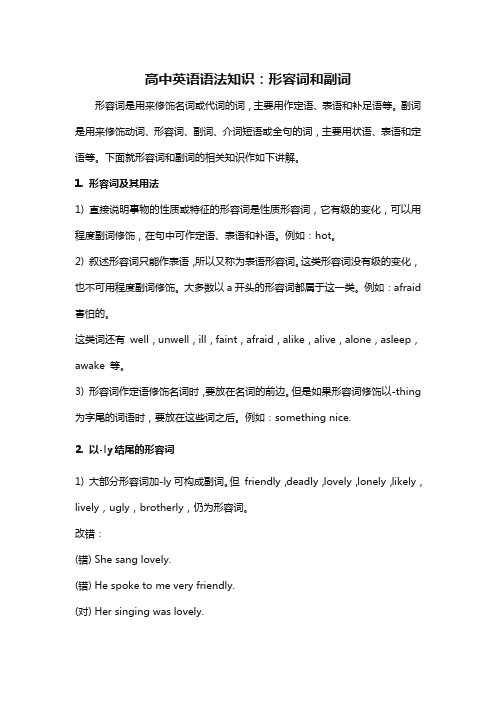
高中英语语法知识:形容词和副词形容词是用来修饰名词或代词的词,主要用作定语、表语和补足语等。
副词是用来修饰动词、形容词、副词、介词短语或全句的词,主要用状语、表语和定语等。
下面就形容词和副词的相关知识作如下讲解。
1. 形容词及其用法1) 直接说明事物的性质或特征的形容词是性质形容词,它有级的变化,可以用程度副词修饰,在句中可作定语、表语和补语。
例如:hot。
2) 叙述形容词只能作表语,所以又称为表语形容词。
这类形容词没有级的变化,也不可用程度副词修饰。
大多数以a开头的形容词都属于这一类。
例如:afraid 害怕的。
这类词还有well,unwell,ill,faint,afraid,alike,alive,alone,asleep,awake 等。
3) 形容词作定语修饰名词时,要放在名词的前边。
但是如果形容词修饰以-thing 为字尾的词语时,要放在这些词之后。
例如:something nice.2. 以-ly结尾的形容词1) 大部分形容词加-ly可构成副词。
但friendly,deadly,lovely,lonely,likely,lively,ugly,brotherly,仍为形容词。
改错:(错) She sang lovely.(错) He spoke to me very friendly.(对) Her singing was lovely.(对) He spoke to me in a very friendly way.2) 有些以-ly 结尾既为形容词,也为副词,如daily,weekly,monthly,yearly,early等。
例如:The Times is a weekly paper. 《时代周刊》为周刊。
The Times is published weekly. 《时代周刊》每周发行一期。
3. 用形容词表示类别和整体1) 某些形容词加上定冠词可以泛指一类人,与谓语动词的复数连接,如the dead,the living,the rich,the poor,the blind,the hungry等。
高中英语形容词和副词
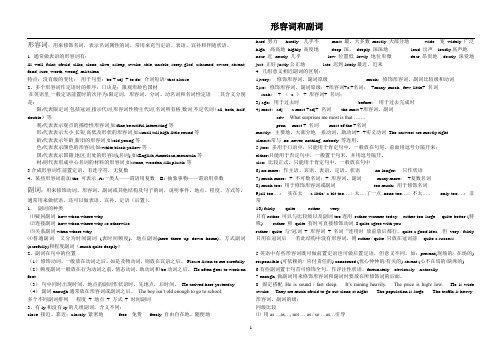
形容词:用来修饰名词,表示名词属性的词。
常用来充当定语、表语、宾补和伴随状语。
1. 通常做表语的形容词有:ill, well, faint, afraid, alike, alone, alive, asleep, awake, able, unable, sorry, glad, ashamed, aware, absent, fond, sure, worth, wrong, mistaken特点:没有级的变化;用于句型:be + adj. + to do/ 介词短语/ that clause2、多个形容词作定语时的排序:口诀是:限观形龄色国材在英语里,一般定语前置时的次序为:限定词,形容词、分词、动名词和名词性定语其含义分别是:限:代表限定词,包括冠词,指示代词,形容词性物主代词,名词所有格,数词,不定代词(all, both, half, double)等.观:代表表示观点的描绘性形容词,如:fine,beautiful,interesting等.形:代表表示大小,长短,高低及形状的形容词,如:small,tall,high,little,round等.龄:代表表示年龄,新旧的形容词,如:old,young等.色:代表表示颜色的形容词,如:white,black,yellow等.国:代表表示国籍,地区,出处的形容词(名词),如:English,American,mountain等.材:则代表形成中心名词的材料的形容词,如:stone, wooden,silk,plastic等.3.合成形容词作前置定语,有连字符,无复数4、某些形容词前加the 可表示A:一类人——谓语用复数B: 抽象事物——谓语用单数副词:用来修饰动词、形容词、副词或其他结构及句子的词,说明事件、地点、程度、方式等。
通常用来做状语,还可以做表语、宾补、定语(后置)。
1.副词的种类⑴疑问副词how when where why⑵连接副词how when where why so otherwise⑶关系副词when where why⑷普通副词又分为时间副词(表时间频度),地点副词(here there up down home),方式副词(carefully)和程度副词(much quite deeply)2、副词在句中的位置(1)修饰动词,一般放在动词之后,如是及物动词,则放在宾语之后。
高中英语语法:形容词和副词(共61张PPT)

一、形容词和副词的句法功能
1.作定语 形容词作定语一般位于被修饰词的前面;副词作定语多表示时间 或地点,位于被修饰词的后面。 Widespread poverty in Africa means that many people there cannot get the water, clothing, housing, electricity, or education they need.非 洲普遍的贫穷意味着那里的许多人不能获得他们需要的饮用水、 衣服、房屋、电力及教育。 The people there were friendly.那儿的人很友好。(副词作定语须 后置)
the English英国人
(2)“the+形容词”表示抽象概念,作主语时谓语动词用单数。
the best最好的情况
the unknown未知的事
the impossible不可能的事
the right正确的事
二、形容词和副词的位置
1.形容词的位置 (1)一般情况下,单个形容词都位于所修饰的名词前。
一二、介 形词 容的 词分 和类副词的位置
(3)形容词也可位于被修饰名词之后。
③两个意义相近或相反的形容词用and, or或but连接,作定语时须后 置。 Power stations, large or small, have been set up all over the country.大大 小小的发电站已经在全国建立起来了。 All the people on this island, young or old, are fond of music.这个岛上的 老老少少都喜欢音乐。(意义相反。) ④当“形容词+不定式”构成的短语作定语时。 A man so difficult to please must be hard to work with.一个如此难以取悦 的人一定很难共事。 He enjoys the music pleasant to listen to.他很喜欢这首听起来很好听的 音乐。
高中英语高考语法复习形容词与副词

高考英语形容词与副词一、形容词01 形容词的句法功能02 形容词的位置形容词作定语时一般置于被修饰词前作前置定语,下列情况中形容词通常后置于被修饰词。
(1)修饰something,anybody,nobody,anything等复合不定代词时There is nothing wrong with the machine.(机器什么问题都没有。
)(2)形容词词组作定语时She bought a book suitable for children.(她买了本适合孩子们的图书。
)(3)修饰表示数量的词要后置The baby is only five months old.(这个婴儿仅有五个月大。
)(4)enough作形容词修饰名词时,一般放在名词之前,也可放在名词之后We don't bring enough money.(我们没带够钱。
)There‘ll be time enough to relax when you’ve finished your work.(你完成工作后会有足够的时间来放松。
)[注]形容词常见于定语位置和表语位置,以上只列出几种常见情况讲解。
具体位置要视具体形容词及句子而定。
03 多个形容词修饰名词时的语序按以下顺序排列:(1)限定词(a/an,the,this,his,first,one...)(2)表示特征或性质等描述性形容词(good,pretty...)(3)表示大小、长短、高低的形容词(big,long,little...)(4)表示形状的形容词(round,square...)(5)表示年龄、新旧的形容词(old,young,new...)(6)表示颜色的形容词(red,yellow...)(7)表示国籍、地区、出处的形容词(America,southern,Italian...)(8)表示物质材料的形容词(wooden,woollen,glass...)(9)表示用途、类别的形容词(medical,writing...)a beautiful large green Chinese carpet一块漂亮宽大的绿色的中国地毯the first three days 头三天enormous black iron gates 巨大的黑色铁门04 形容词的特殊用法二、副词01 副词的种类根据词义可分为:(1)时间副词yesterday(昨天),today(今天),now(现在)等。
高中英语语法 (形容词、副词篇)
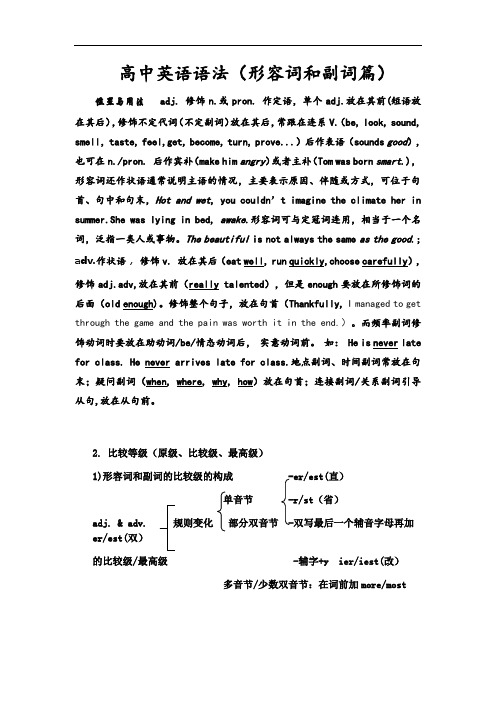
高中英语语法(形容词和副词篇)位置与用法adj. 修饰n.或pron. 作定语,单个adj.放在其前(短语放在其后),修饰不定代词(不定副词)放在其后,常跟在连系V.(be, look, sound, smell,taste, feel,get, become, turn, prove...)后作表语(sounds good),也可在n./pron. 后作宾补(make him angry)或者主补(Tom was born smart.),形容词还作状语通常说明主语的情况,主要表示原因、伴随或方式,可位于句首、句中和句末,Hot and wet, you couldn’t imagine the climate her in summer.She was lying in bed, awake.形容词可与定冠词连用,相当于一个名词,泛指一类人或事物。
The beautiful is not always the same as the good.; adv.作状语,修饰v. 放在其后(eat well, run quickly,choose carefully),修饰adj.adv,放在其前(really talented),但是enough要放在所修饰词的后面(old enough)。
修饰整个句子,放在句首(Thankfully, I managed to get through the game and the pain was worth it in the end.)。
而频率副词修饰动词时要放在助动词/be/情态动词后,实意动词前。
如: He is never late for class. He never arrives late for class.地点副词、时间副词常放在句末;疑问副词(when, where, why, how)放在句首;连接副词/关系副词引导从句,放在从句前。
高中英语语法漫谈五 形容词副词
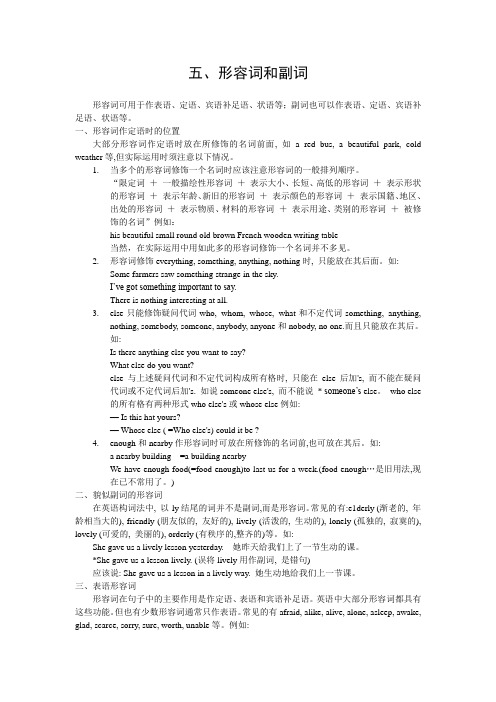
五、形容词和副词形容词可用于作表语、定语、宾语补足语、状语等;副词也可以作表语、定语、宾语补足语、状语等。
一、形容词作定语时的位置大部分形容词作定语时放在所修饰的名词前面, 如 a red bus, a beautiful park, cold weather等,但实际运用时须注意以下情况。
1.当多个的形容词修饰一个名词时应该注意形容词的一般排列顺序。
“限定词+一般描绘性形容词+表示大小、长短、高低的形容词+表示形状的形容词+表示年龄、新旧的形容词+表示颜色的形容词+表示国籍、地区、出处的形容词+表示物质、材料的形容词+表示用途、类别的形容词+被修饰的名词”例如:his beautiful small round old brown French wooden writing table当然,在实际运用中用如此多的形容词修饰一个名词并不多见。
2.形容词修饰everything, something, anything, nothing时, 只能放在其后面。
如:Some farmers saw something strange in the sky.I’ve got something important to say.There is nothing interesting at all.3.else只能修饰疑问代词who, whom, whose, what和不定代词something, anything,nothing, somebody, someone, anybody, anyone和nobody, no one.而且只能放在其后。
如:Is there anything else you want to say?What else do you want?else与上述疑问代词和不定代词构成所有格时, 只能在else后加's, 而不能在疑问代词或不定代词后加's. 如说someone else's, 而不能说* someone’s else。
高中英语语法形容词和副词

形容词和副词I 形容词及其基本用法形容词修饰名词,说明事物或人的性质或特征。
1.直接说明事物的性质或特征的形容词是性质形容词,它有级的变化,可以用程度副词修饰,在句中可作定语、表语和补语。
例如:hot,happy ,等。
2.叙述形容词只能作表语,所以又称为表语形容词。
这类形容词没有级的变化,也不可用程度副词修饰。
大多数以a-开头的形容词都属于这一类。
例如:afraid害怕的。
[误]She is afraid girl.[正]The girl is afraid.这类词还有: afraid,alike,alive,alone,asleep,awake 以及well,unwell,ill, faint,等。
3.形容词作定语修饰名词时,要放在名词的前边。
但是如果形容词修饰以-thing为词尾的不定代词时,要放在这些词之后。
例如:something nice.4.以1y结尾的形容词(1)大部分形容词加-1y后可构成副词。
注意:friendly,deadly,lovely,lonely,likely,lively,brotherly 等是形容词。
【误】He spoke to me very friendly.[正]He spoke to me in a very friendly way.(2)有些以-1y结尾的词既为形容词,也可为副词,如daily,weekly,monthly,yearly,early等。
例如:China Daily is a daily newspaper.《中国日报》是一份日报。
China Daily is published daily.《中国日报》每天出版。
5.用形容词表示类别和整体(1)某些形容词加上定冠词可以指一类人,与复数谓语动词连用,如the dead,the living,the rich,the poor, the blind.the hungry等。
例如:The poor are losing hope.穷人将失去希望。
高中英语语法复习之形容词和副词

高中英语语法复习之形容词和副词一、形容词:表示人和事物的特征,对名词起修饰和描绘作用。
e.g. long, empty, cheap, hungry, etc.1、成分:在句中作定语、表语、宾语补足语等成分.He is a good student. ()I have something important to tell you. ()当形容词修饰由some-,any-,no-,every-构成的不定代词时,形容词要放在这些不定代词的之后.e.g.Is there anything interesting in today’s newspaper ?The trees turn green in spring. ()We are alone on the island. ()只能作表语,不能作定语的形容词:alone afraid awake asleep alive able形容词和宾语一起构成复合宾语.We must keep the classroom clean. ()He made us happy. ()Colour it green. ()Attention :有些单词以-ly结尾,但却是形容词而非副词:lively、lonely、lovely、deadly、friendly、ugly、silly、likely、timely 、brotherly 、sisterly 、motherly fatherly 等。
形容词的原级句型:1)as+形容词原形+asTom is as tall as Mike.Tom is three times as old as Mike.There are as many students in our school as yours.2)否定not as+形容词原形+as “和… 不一样”或not so+形容词原形+as “不及/不如…Tom is not as tall as Mike.Tom is not so tall as Mike.3)so+ 形容词原级+that丛句/such+名词+that丛句He is so big that he can’t enter the room by the door .4)… too+原级+ to do sth.He is too young to join the army.5)形容词原级+ enough to do sth.This truck is big enough to carry 5 tons.形容词比较级的句型:1)比较级+than…Our school is larger than theirs.This bridge is longer than that one.表示两者之间的选择,可使用“Which is+ 比较级,…or…?”Which is longer, this one or that?2)表示不及另一方时,使用“less+原级+than…”This park is less beautiful than that one.3)“The+比较级…,the+比较级…”The smaller the house is, the less it will cost us the heat.4)“…比较级+and+比较级…”In spring, the days are getting longer and longer.可修饰比较级的词:a bit, a little, rather, much, far, by far, many, a lot, lots, a great deal, any, still, even等典型例题:1)--- Are you feeling ____?--- Yes,I'm fine now.A. any wellB. any betterC. quite goodD. quite better2)The experiment was ____ easier than we had expected.A. moreB. much moreC. muchD. more much3)If there were no examinations, we should have ___ at school.A. the happiest timeB. a more happier timeC. much happiest timeD. a much happier time 注意:no/ not + 比较级+ than 的特殊含义• A is no more careful than B.•A和B两人都不仔细。
- 1、下载文档前请自行甄别文档内容的完整性,平台不提供额外的编辑、内容补充、找答案等附加服务。
- 2、"仅部分预览"的文档,不可在线预览部分如存在完整性等问题,可反馈申请退款(可完整预览的文档不适用该条件!)。
- 3、如文档侵犯您的权益,请联系客服反馈,我们会尽快为您处理(人工客服工作时间:9:00-18:30)。
高中英语语法系列――形容词和副词[知识梳理]一、形容词的概念与用法形容词(adjective)用以修饰名词,表示人或事物的特征。
它可在句中充当定语,修饰名词、代词;可以作表语或宾(主)语的补足语,表示主语或宾语的状态、特征;有时也可以作状语。
如:This is a beautiful school.这是一所美丽的学校。
(作定语,修饰名词school)I have something important to tell you.我有些重要的事要告诉你们。
(作定语,修饰不定代词something)Our school is beautiful.我们学校很美丽。
(作表语)We’ll make our school more beautiful.我们要使我们的学校更美丽。
(作宾补)Our school will be made more beautiful.我们的学校将会变得更美丽。
(作主补)He got home late that night, hungry and tired.那天晚上他很迟才回来,又累又饿。
(作状语)二、副词的概念与用法副词(adverb)用以修饰动词、形容词或其它副词。
它在句中主要作状语,个别副词也可作表语、定语、或宾(主)语补足语。
He studies hard.他学习很努力。
(作状语,修饰动词)I’m terribly sorry for being late. 非常抱歉,我迟到了。
(作状语,修饰形容词)This coat fits him very well.这件上衣他穿着很合适。
(作状语,修饰副词)The people here are kind to us.这里的人对我们很好。
(作定语,修饰The people)When will you be back? 你什么时候回来?(作表语)三、形容词与副词的转换有的形容词加上ly后可转换成副词,规则如下:注意:friendly, motherly, lovely等词虽然以ly结尾,但不是副词,而是形容词。
四、复合形容词五、形容词、副词的比较级和最高级构成1. 规则变化2. 特殊变化六、常用形容词、副词比较句型七、需要注意的几点1. 避免漏用系动词be。
[译]我今天很忙。
[误]I very busy today.[正]I am very busy today.2. 避免修饰错误。
[误] She studies more better than I.[正] She studies much better than I.3. 避免产生岐义。
[译]我比她更喜欢那个男孩。
[误]I like the boy better than her.(还可以理解为:我喜欢那个男孩胜过喜欢她)[正]I like the boy better than she.4. 避免比较对象不一致。
[误] Her spoken English is as good as I.[正] Her spoken English is as good as mine.[正] She speaks English as well as I.5. 避免自己与自己比较。
[误]He runs faster than any student in his class.[正]He runs faster than any other student in his class.[正]He runs faster than anybody else in his class.[正]He runs faster than (all) the other students in his class.[正]He runs faster than (all) the others in his class.[正]He runs faster than any of the other students.[正]He runs (the) fastest (of the boys) in his class.6. 从句中“替代”或“省略”时,应使结构清楚、正确。
I spend as much time watching TV as he does______(write). (Key: writing)[灵活运用]一、单句填空按照下面句子结构的语法性,在空格处填入一个适当的词或使用括号中词语的适当形式填空。
1. If there were no examinations, we should have a much ______(happy) time at school.2. Professor White has written some short stories, but he is ______(well) known for his plays.3. ―How did you find your visit to the museum?―I thoroughly enjoyed it. It was far _______(interesting) than I expected.4. I was expecting much ______ (big) rooms. I was ______ (terrible) disappointed.5. You are so good to me. I am the ______ (lucky) person in the world.6. As we all know, English is ______(wide) used in the world.7. A new playground for our children is ______(bad) needed.8. How beautifully she sings! I have never heard a______(good) voice.9. We decided not to climb the mountains because it was raining _______(heavy).10. He is ______(true) happy who makes others happy.二、句子翻译将下列句子翻译成英语,注意下划线部分的用法。
1. 在场的那些人都是他的朋友。
2. 他这学期取得的进步比上学期大得多。
3. 他说的话听起来合情合理。
4. 伦敦没有纽约那么现代。
5. 你准备得越快,我们就离开的越早。
6. 一米是一英尺的三倍多长。
7. 汤姆身高1.8米。
8. 我哥哥比我大两岁。
9. 米价格比上个月上涨了15%。
10. 找工作比过去越来越困难了。
三、篇章运用阅读下面短文,按照句子结构的语法性和上下文连贯的要求,使用括号中词语的正确形式填空或者将汉语翻译成英语。
It’s ___1___ (legal) to drive under the age of eighteen in America. But a ___2 ___(十八岁的) boy managed to pass a driving test on the day of his eighteenth birthday. Most people would consider this ___3___(possible) because he needed a lot of lessons to pass the test. But he arranged to have a___4___ (六小时的) lesson beginning at dawn on his birthday. At first,he was ___5___(care) and hesitant, but he had a wonderful teacher and his driving improved ___6___(great) during the day. By four in the afternoon,still feeling___7___(energy), he was ready to take his test.He passed the first time! He was___8___(extreme) shocked and drove home very___9___(slow) in the reddish light because the sun was setting. When he got home,he showed his grandfather his certification and told him his whole story. His grandfather broke into smiles,congratulated him___10___(warm) and yelled, “My great kid Like me.”参考答案一、单句填空1. happier。
考试与无考试之间进行比较,用比较级。
2. better。
写短篇故事与写剧本比较“更”有名。
3. more interesting。
此处程度副词far用来修饰比较级。
4. bigger, terribly。
我原本盼望更大的房间,所以用比较级。
terribly修饰表语disappointed。
5. luckiest。
“世上最幸运的”,使用最高级。
6. widely。
副词widely、highly、deeply表示抽象意义,而副词wide、high、deep表示具体意义,如:His eyes were wide open.。
7. badly。
副词badly修饰被动语态。
8. better。
她唱的声音与所听的声音比较,故用比较级。
9. heavily。
“下大雨(雪)”的“大”用副词heavily。
10. truly。
谚语“真正幸福的是使人幸福的人”。
true变为副词时要去掉e。
二、句子翻译1. The people present were all his friends.2. He has made much more progress this term than he did last term.3. What he said sounded reasonable.4. London is not so modern as New York.5. The quicker you get ready, the sooner we’ll be able to leave.6. A metre is more than three times longer than a foot.7. Tom is 1.8 metres high.8. My elder brother is two years older than me.9. The price of rice is 15% higher than last month.10. It’s getting more and more difficult to find a job.三、篇章运用本文是讲述“他”在18岁生日的那天学习、考试、拿到驾照的经历。
